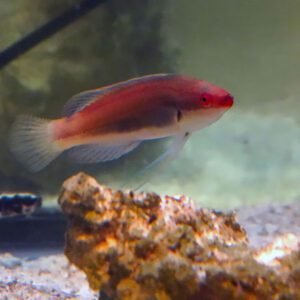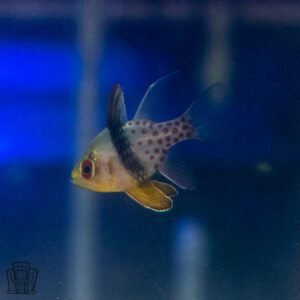Description
Scientific Name: Meiacanthus bundoon
Common Names: Bundoon Blenny, Blackline Fang Blenny, Black-lined Blenny
Maximum Length: 3 inches (8 cm)
Minimum Aquarium Size: 30 gallons (113 liters)
Foods and Feeding Habits: Omnivorous; feeds on zooplankton, small crustaceans, and algae in the wild. In aquariums, offer a varied diet of frozen mysis shrimp, brine shrimp, flake foods, or algae-based pellets. Feed 1-2 times daily in small amounts to maintain water quality.
Reef Safety: Reef-safe; poses no threat to corals or invertebrates. Safe with ornamental shrimp and clams, making it an excellent choice for reef tanks.
Temperament: Peaceful to semi-aggressive; generally docile but may defend its territory against similar-sized fish or other blennies. Suitable for community tanks with peaceful to moderately assertive tankmates. Avoid housing with aggressive species or multiple blennies in smaller tanks.
Description: The Meiacanthus bundoon is a favorite among hobbyists for its striking appearance and charming behavior. With a sleek body adorned with a bold black stripe running from head to tail, this blenny adds a touch of elegance to any aquarium. Aquarists appreciate its curious nature—it’s often seen perching on rocks or darting into crevices, always keeping the tank lively with its subtle movements. A 30-gallon tank with plenty of hiding spots suits its exploratory habits, and a mixed diet of meaty and algae-based foods keeps it healthy and vibrant. Its ability to hold its own in a community tank without causing trouble makes it a versatile pick, offering both visual appeal and a dash of personality that seasoned hobbyists value in their reef setups.
Fun Facts
- The Bundoon Blenny’s venomous fangs, though harmless to humans, help it deter predators in the wild.
- Its distinctive black stripe makes it easy to spot as it weaves through rockwork or hovers near corals.
- This species is known for its “hopping” swimming style, adding a playful quirk to its tank presence.





